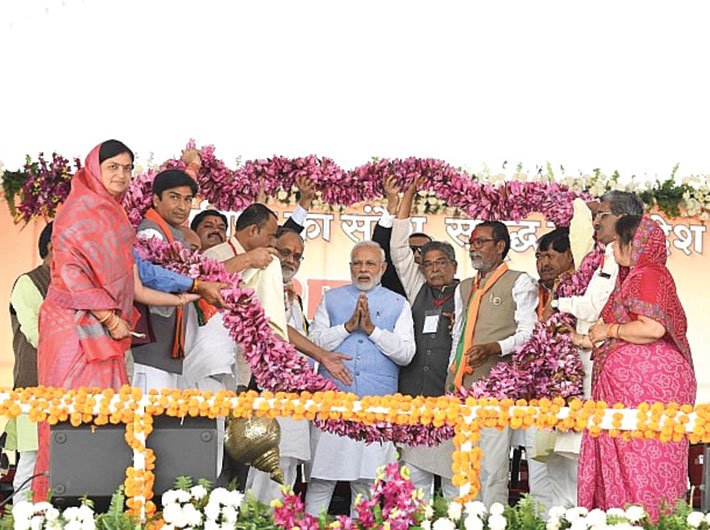In the late 1990s Modi engineered the social profile of the BJP’s support base in Madhya Pradesh, expanding on Kushabhau Thakre’s work. The party can still bank on it for the elections
During his stint as BJP general secretary (organisation) and in-charge of Madhya Pradesh affairs in the late 1990s, Narendra Modi had acquired a new nickname. He was called “master sahib”, because of his persuasive way of running the party’s organisation and reshuffling the support base.
Of course, in 1998, Madhya Pradesh emerged as a strong bastion of the BJP which retained a substantial support in the urban areas and among the upper castes. Historically, the BJP and its earlier avatar, the Bharatiya Jana Sangh (BJS), have had their strongest base across India in this state because of sustained groundwork. The man who oversaw the parties’ growth from strength to strength in Madhya Pradesh, right from the late 1950s, was Kushabhau Thakre, the most efficient organisation man in the BJP and its president from 1998 to 2000.
But Thakre’s style of building and consolidating the party organisation was quite traditional, straight from the textbook. He roped in workers from within the Sangh Parivar constituents and trained them to become political activists. In 1998, Modi introduced radical changes in the Madhya Pradesh unit that rubbed the traditional leadership of the party the wrong way. And MP had a plenty of top leaders ranging from Sunder Lal Patwa, Vikram Varma and Kailash Joshi to young, emerging leaders like Uma Bharti. Modi encouraged a new breed of leadership and goaded the organisation into expanding its arc of influence to the scheduled castes and tribals whom he regarded as low-hanging fruits. His efforts met with strong resistance from within the BJP’s state leadership. Yet he continued with the strategy of reorganising the social bases and roping in marginalised sections to the Hindutva fold.
Though the BJP lost the state election in 1998, the party’s expansion was quite evident among tribals, OBCs and SCs – the sections that traditionally sided with the Congress. In 2003 assembly elections, the emergence of Uma Bharti, and subsequently Shivraj Singh Chouhan, was a natural corollary to the persuasive strategy of organisational expansion of none else but the “Master Sahib” of 1998. There is little doubt that the 15 years of BJP’s uninterrupted reign has come with a cost. Its traditional supporters, the land-owning upper castes, are substantially alienated. Yet, there is a strong possibility that this political attrition is replaced by an accretion of social bases from marginalized sections, particularly from SCs, tribals and the urban poor. Intriguingly, this numerically strong social base is not as articulate as conventional BJP supporters.
In Malwa region of the state, the BJP does not seem to be on as sticky a wicket as it is in Chambal and Bundelkhand. The region which comprises a significant part of the state is urbanised and prosperous. For instance, Indore is known as “mini Mumbai” for people of the state due to its prospering trade and business. The city is a delight for foodies and street-food is a craze. At Sarrafa Bazar, which is the biggest centre for business of gold, diamonds and ornaments, there is palpable dullness as compared to the past. “Yes, our business has gone down since demonetisation,” acknowledge shopkeepers. Yet, they do not hold it against the prime minister. “We are BJP voters and we cannot think of going elsewhere,” they say when asked if their voting choice will change this time.
Indore is a strong bastion of the BJP from where Lok Sabha speaker Sumitra Mahajan has won eight times in a row. In the past decade, the city has transformed itself into a model for the rest of India on account of its cleanliness and civic facilities. Only 15 years back, the city was a veritable urban mess during Digvijay Singh’s tenure. Even slums are refurbished and provided with amenities to ensure cleanliness and hygiene. The changing face of Indore and its adjoining urban areas has found appreciation even among the marginalised people. By no indication, this BJP bastion is showing any sign of vulnerability. The union government’s schemes of facilitating house construction of the poor, access to electricity and cooking gas connection in rural areas have found great resonance among the electorate.
There is no doubt that people’s aspirations have risen exponentially over the years. And 15 years is a long time for people to get weary of one dispensation. Yet the electorate is quite wary of a change for the worse. Given the history of Digvijay Singh’s one decade of governance from 1993-2003, a substantial number of people from the older generation is not only cynical about the Congress but recall the past with trepidation. And the presence of a scion of the erstwhile Gwalior state, Jyotiraditya Scindia, and industrialist Kamal Nath does not adequately assure the electorate that the Congress leaders will change their spots. In this region, the BJP’s social engineering, robust organisation and Modi’s charm will combine to protect the turf of Shivraj Singh Chouhan. As far as the Congress is concerned, it seems to have internalised the dictum, “Losing, like winning, is a habit.”
[This comment has appeared on FirstPost.com]

